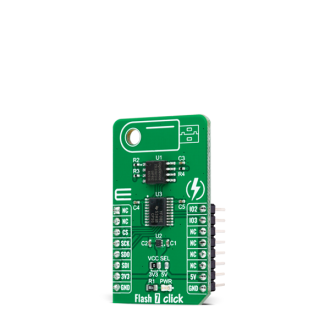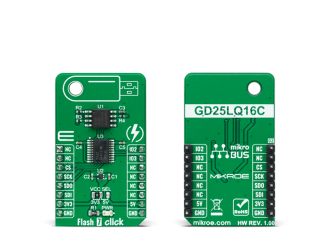
We strongly encourage users to use Package manager for sharing their code on Libstock website, because it boosts your efficiency and leaves the end user with no room for error. [more info]

Rating:
Author: MIKROE
Last Updated: 2020-12-22
Package Version: 1.0.0.0
mikroSDK Library: 1.0.0.0
Category: FLASH
Downloaded: 1447 times
Not followed.
License: MIT license
Flash 7 Click is a compact add-on board that contains a high-performance memory solution. This board features the GD25LQ16C, a high-performance 16Mbit SPI NOR Flash Memory solution with advanced security features from GigaDevice Semiconductor.
Do you want to subscribe in order to receive notifications regarding "Flash 7 click" changes.
Do you want to unsubscribe in order to stop receiving notifications regarding "Flash 7 click" changes.
Do you want to report abuse regarding "Flash 7 click".


Library Description
The library covers all the necessary functions to control Flash 7 Click board™. Library performs a standard SPI interface communication.
Key functions:
void flash7_chip_erase ( void ) - Chip erase function.uint8_t flash7_page_program ( uint32_t mem_addr, uint8_t *p_tx_data, uint16_t n_bytes ) - Page program function.void flash7_read_memory ( uint32_t mem_addr, uint8_t *p_rx_data, uint16_t n_bytes ) - Read memory function.Examples description
The application is composed of three sections :
void application_task ( )
{
mikrobus_logWrite( "-----------------------", _LOG_LINE );
mikrobus_logWrite( "<- Read data : ", _LOG_TEXT );
flash7_read_memory( memory_addr, &rx_data[ 0 ], 9 );
mikrobus_logWrite( rx_data, _LOG_LINE );
Delay_ms( 5000 );
}
Other mikroE Libraries used in the example:
Additional notes and informations
Depending on the development board you are using, you may need USB UART click, USB UART 2 click or RS232 click to connect to your PC, for development systems with no UART to USB interface available on the board. The terminal available in all MikroElektronika compilers, or any other terminal application of your choice, can be used to read the message.